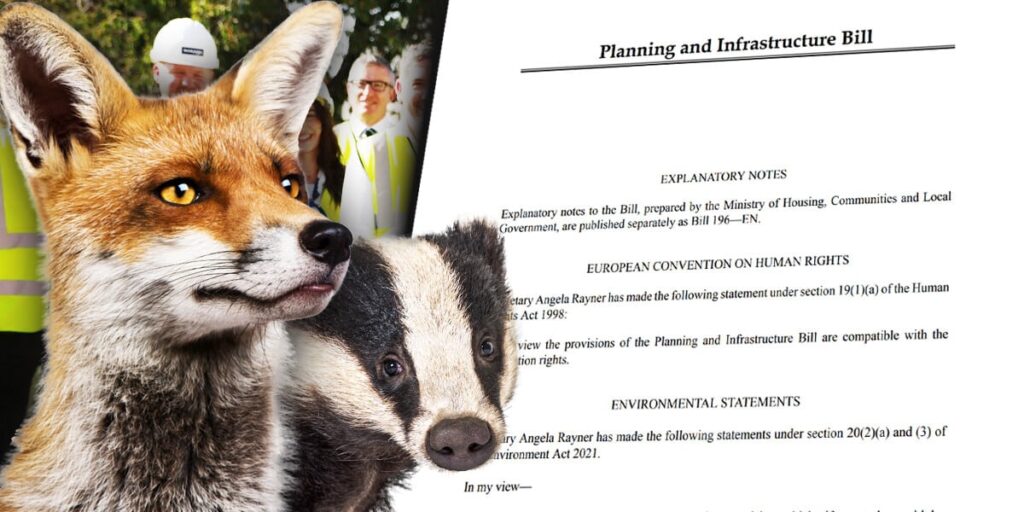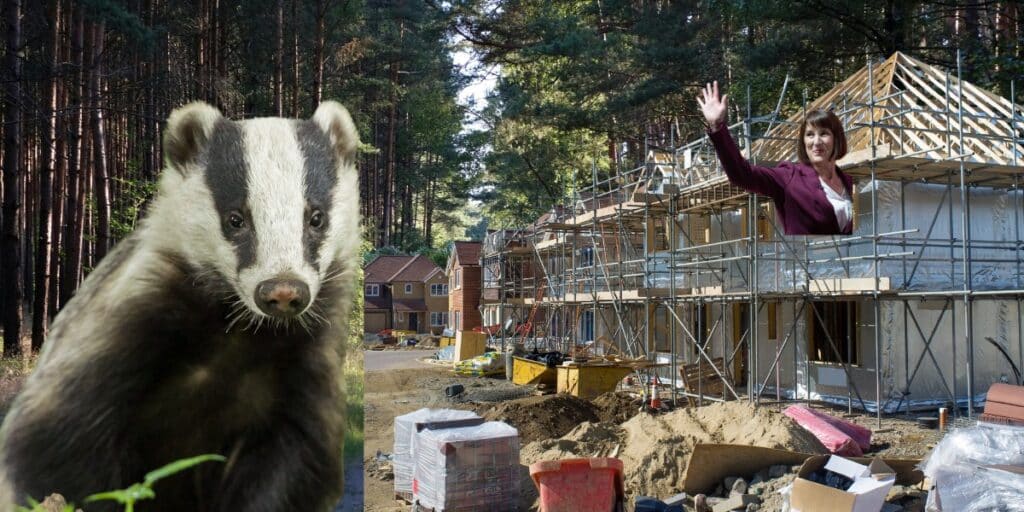In April, dozens of environmental experts signed an open letter opposing the government’s Planning and Infrastructure Bill (PIB).
But on 13 October, the Ministry of Housing, Communities and Local Government announced several further “pro-growth” changes to the bill. According to a Gov.UK press-release, new powers “for the Secretary of State could stop councils rejecting planning permissions, tackle blockers in the courts, alongside plans to accelerate reservoirs, windfarms and large housing schemes”.
What might that mean in practice?
Surveys
Among the myriad of issues with the bill, it removes a requirement on developers to conduct timely ecological surveys in areas where newly created Environmental Development Plans (EDP) apply to their project.
An ecological survey assesses a proposed development to establish any environmental impact it may have.
In June, Natural England’s CEO, Marian Spain, told the Environmental Audit Committee (EAC) that EDPs will be applied in “the places where nature will benefit from that more strategic approach.”
According to Spain, instead of developers conducting surveys of proposed building sites in EDPs, the responsibility of determining harms posed by developments will fall to Natural England, She told the EAC that “surveys will be done up front by Natural England using data from a range of sources” rather than being “done by a developer at the time of development.”
Spain added that Natural England will do these surveys “up to 10 years in advance.”
It is deeply shocking that this plan – relying on data up to 10 years old to determine the existing make-up of wild communities – could be championed by the CEO of the body that advises the government on nature conservation, let alone become official policy.

Badgers under attack – again!
In written evidence provided to the EAC following Spain’s comments to the committee, Rosie Wood, Chair of the Badger Trust, laid out in stark detail what the PIB means in practice – paying particular attention to badgers in her remarks.
Wood says the animals have been “singled out for particular mistreatment” in the PIB, as it plans to weaken parts of the Protection of Badgers Act.
“This Act, brought into existence in 1992, is a hard-fought legal protection for an animal that has suffered unprecedented persecution for decades. Now, for the first time ever, this PIB would allow badgers to be killed or forcibly removed just to make way for development.”
This point was forcefully reiterated in the 13 October badger cull petition debate that Protect the Wild triggered (see “Badger Cull dismantled on all sides“). Speaking in the debate, Tim Farron (Lib Dem, Westmorland and Lonsdale) attacked the PIB saying:
“It is interesting to note that the Government are now committed to ending badger culling by the end of this Parliament—by 2029 specifically—yet at the same time the Government’s Planning and Infrastructure Bill includes provision for the killing of badgers if they get in the way of housing development.”
Farron then turned to Gideon Amos MP (Lib Dem, Taunton and Wellington) who hammered home the same concerns:
“We have been debating today badger culling to control TB, and I believe that badger culling should be phased out as quickly as possible, but the Planning and Infrastructure Bill provides for the killing of badgers not to control TB – not for public health purposes – but for general public purposes. I ask the Government to look again at why that is justified. Why do we need additional legislation to kill badgers?”
Causing unnecessary suffering to wild animals
The PIB may also put developers in the crosshairs of legislation that protects the welfare of wild animals.
As the Animal Sentience Committee (ASC) highlighted in June, it is “incumbent on the government to pay all due regard to the ways a policy might impact animal welfare,” yet the IPB “does not mention the welfare of sentient animals” at all.
Wood foresees that developers may face complaints under the Animal Welfare Act where any unnecessary suffering they cause to wildlife is apparent. She wrote:
“Having planning permission will be no defence to accusations or charges of causing unnecessary suffering to a sentient animal and will do nothing for a developer’s brand value, their construction timeline or their costs.”
We’re confident that any developer (or government) that allows animals to suffer just to ‘build, baby, build’ will not be forgiven by Protect the Wild or our supporters…
Nature not a block
Quoted in the same 13 October press-release, Chancellor of the Exchequer, Rachel Reeves, was in typically bullish form:
“Our pro-growth planning bill shows we are serious about cutting red tape to get Britain building again, backing the builders not the blockers to speed up projects and show investors that we are a country that gets spades in the ground...”
Former Environment Secretary and now current Housing Secretary Steve Reed joined in the pile-on:
“Britain’s potential has been shackled by governments unwilling to overhaul the stubborn planning system that has erected barriers to building at every turn.”
But how true is that?
As a recent report by Key Cities showed issues of “costs and finance”, “land availability”, “developer delays” and “skills shortages” all come ahead of issues with the “planning system” when it comes to what is “stalling national housebuilding.”
In other words, surveys and legislation protecting nature are NOT why housing and infrastructure developments might be delayed.
The government is considering tearing up key parts of European environmental rules and wants to reform the judicial review process as part of its PIB. It would allow developers to bulldoze sites without conducting timely, comprehensive wildlife surveys. It also threatens to weaken protection for one of the country’s most loved – but most maligned – mammals: the badger.
- Protect the Wild will say it again: the PIB is an unjustified assault on the environment and there is no justification for sacrificing nature to “get Britain building”.
- And it is utterly inexcusable that having just acknowledged that badgers will be safe from any future culls, the government should now be threatening to weaken the one major piece of legislation that protects them.


